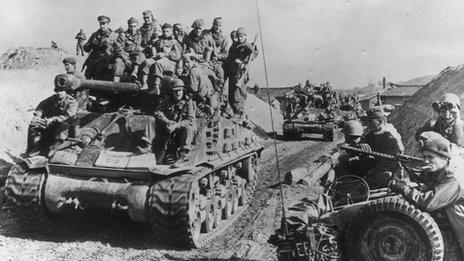Irish veterans of Korean war recall conflict
- Published

The British army suffered about 5,000 casualties as part of the United Nations force in Korea
The men who fought in it call it the "forgotten war".
But 60 years after the Korean war ended, veterans from both sides of the Irish border have been remembering the conflict and the terrible toll it took.
For three years from 1950, United Nations forces, including British and American contingents, fought North Korean and Chinese armies that had invaded South Korea.
Anthony Thorpe, a Dubliner, joined the Army while living in England, and served in Korea with the Ulster Rifles.
Freezing cold
Now aged 85, he remembers Chinese soldiers coming at him in droves, the horrendous casualties, his lost comrades and the military medal, the MM, that he did not get.
"There was one chap who walked into a minefield and got he back of his legs blown off.
"I carried him out. As far as I know, the sergeant took him off my shoulder when I got out of the field. He got the MM and I got the stained shirt. It should have been the other way around but it wasn't to be," he says.
Soon to be 82-year-old former corporal Frank Gorman, from Tempo in County Fermanagh, served in Korea as a mechanic and engineer attached to the King's Own Scottish Borderers.
One of his abiding memories of the war is the weather, the heat in the summer and how the freezing cold of the winter affected both him and the trucks and machines he maintained.
He says: "The frost was that severe that if you didn't get your tea drank as you went along a sheet of ice would form over the top of it. That's my worst experience."
The Korean war is often referred to as the forgotten war by those who fought in it.
Among them is retired brigadier Brian Parritt who has written a memoir of his experiences called Chinese Hordes and Human Waves.
"It was such a long way away and it came so closely after the great battles of the Second World War. At three years it didn't last all that long. And it never made the impact in this country as we had economic problems recovering after a major war. So, it has slipped a bit from people's memories," he says.
But it has not slipped from the memories of the South Koreans who say they are grateful to the UN soldiers for their freedom.
Terrible price
While the closed, communist north endures famines and poverty under the rule of one family with nuclear ambitions, the south has become a modern democratic society and an economic power-house.
That's something the veterans who returned to Korea in April quickly discovered.
Canon Robert Jennings, who lives in County Wicklow, found it hard to believe how much its capital, Seoul, had changed.
He says: "There was nothing there except ruins when we left. But when I was back last April it was a magnificent beautiful city of skyscrapers, three-tier roads and the bullet train. We went on that at 200 miles an hour."
But that freedom and economic turnaround came with a terrible price.
An estimated 2.5 million people died in the war, including 5,000 British soldiers.
Before leaving his home Canon Jennings read for me the following lines of the Korean Lament by Mark McConnell, an Irish man who also fought in the war:
There's blood on the hills of Korea,
It's the blood of the freedom we love,
May our names live in glory forever,
And our souls rest in Heaven above,
And, boy, when you go back to Dublin and Belfast,
When this war is over and done,
Just think of the ones left behind you,
Out in the Korean sun.